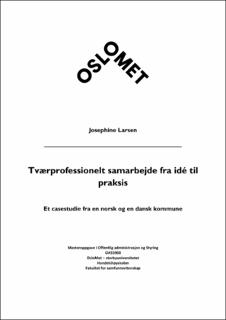Tværprofessionelt samarbejde fra idé til praksis Et casestudie fra en norsk og en dansk kommune
Master thesis
Published version
Permanent lenke
https://hdl.handle.net/11250/2778485Utgivelsesdato
2021Metadata
Vis full innførselSamlinger
Sammendrag
In Norway and Denmark, most local health authorities adhere to a policy of integrated and person-centred care. Due to recent structural reforms, service providers are encouraged to develop health and social care services in order, to better support elderly citizens with disabilities, to live active and independent lives. The municipalities must manage and organize services based on new service ideals aiming at more cooperation across different disciplines and agencies. In short, the ideal implies that employees from different professional groups must be united in a holistic picture of the citizen's situation. This master's thesis wants to shed light on the challenges municipal leaders will face when they strive to realize these ideals. The thesis investigates how leaders in collaboration with the professionals translate ideas about inter-professional collaboration into new organizational structures and how new organizational arrangements materialize in practice. The thesis will use translation theories, and theories of inter-professional collaboration and team collaboration for the interpretive framework for the analysis.
This master's thesis is based on empirical data from the CONTEXT project. I gained access to the empirical data material through research practice on the CONTEXT project in the autumn of 2020. I have chosen to limit this master's thesis to one Danish and one Norwegian municipality. From a comprehensive data material, I have mainly used transcribed interviews with leaders and staff who have experiences with the municipalities' inter-professional organization.
The empirical analysis of the master's thesis shows that the two municipalities have chosen to organize their services as fully integrated interdisciplinary teams. The ideal of integrated and high performing teams is often used when an inter-professional collaboration is to be organized, even though there are other ways to organize inter-professional work. The two municipalities seem to have adopted the team ideal based on recommendations. They have chosen to close down previous mono-disciplinary services and to organize teams around different clients and care trajectories.
Professionals generally support the idea of inter-professional collaboration in teams. The team-organization in the two municipalities' internal documents and websites creates the impression that citizens are met by interdisciplinary teams who work closely together. However, the empirical analysis shows that the prerequisites for successful inter-professional teamwork is (more or less) lacking in the municipalities. In both municipalities, the professionals have different working hours, work rhythm and location, and partly work with different categories of clients. These differences affect the municipalities' ability to hold interdisciplinary meetings in the teams and hence the ability to develop common goals and rules for coordination and communication. It turns out that the interdisciplinary teams in some cases caused the employees to lose their monodisciplinary sparring partners. They experienced to be left alone in professionally demanding situations.
When leaders need to translate political service ideals, they should think of the whole of the service apparatus. They can advantageously be more critical of how to balance the financial resources against the professional work. In addition, municipal leaders should be less seduced by the team ideal. As the master's thesis and previous research show, a superstition about team organization has been formed. The inter-professional team organization can overshadow the benefits of strong monodisciplinary environments and contribute to a dilemma-filled practice. In a long-term perspective, it will also be relevant to think about how leaders best can ensure that employees experience the opportunity to develop professional security.
